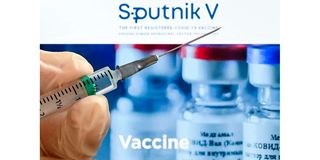Firm seeks nod to export banned Sputnik V vaccine

A syringe with the webpage of Russia's Sputnik V vaccine against the coronavirus disease in the background.
The company that imported the now banned Sputnik V vaccine has asked the government to allow it ship the drug to Lebanon or Pakistan.
The Ministry of Health stopped the importation, distribution and administration of Covid-19 vaccines by private firms on April 2.
In an April 6 letter addressed to Health Principal Secretary Susan Mochache and copied to Cabinet Secretary Mutahi Kagwe, Dinlas Pharma EPZ Ltd requested for approvals and permission to export the vaccine to the two countries by April 8.
The letter said the company imported the vaccine after receiving the requisite licence and is storing it under the prescribed temperature of -18 degrees Celsius at Jomo Kenyatta International Airport.
The letter indicated Dinlas Pharma EPZ Ltd is incurring huge storage costs.
The firm said it intends to export the remaining doses of Sputnik V vaccine in Kenya – both component I and II – immediately.
“We are writing this letter with reference to the ban by the government on importation, distribution and administration of Covid-19 vaccine by the private sector. We are incurring heavy costs for storage and due to the ban. We would like to immediately export the doses to either in Lebanon or Pakistan,” the letter says.
“We request the Ministry of Health to give us necessary approvals... to export the vaccines by April 8, 2021.”
Bilateral arrangements
In a resolution announced by Mr Kagwe, who chairs the National Emergency Response Committee (NERC) the government said the country would only acquire vaccines through the Covax facility, the Africa CDC platform or bilateral arrangements.
According to committee, Kenya will only buy vaccines that have been pre-qualified for emergency use by the World Health Organization (WHO).
It added that Sputnik V is not yet one of the vaccines though it is in use in several countries.
“Our focus as a country has been to go for vaccines in the WHO list. This is because all the works, including safety and efficacy, have been done for us and the global community. Vaccines being used in Kenya must be cleared by WHO and the Pharmacy and Poisons Board (PPB),” Mr Kagwe said.
The minister said it is only the government that is authorised to carry out Covid-19 vaccinations “until further notice”.
“The government is...closing the window of private sector importation, distribution and administration of vaccines until such a time it is confident there is greater transparency and accountability in the entire process in the interest of public health safety,” he said.
The decision, according to the committee, would ensure transparency and accountability in the vaccination campaign.
The committee said participation of private firms in the drive threatens the gains made in the fight against Covid-19 and puts the country at risk should counterfeit commodities find their way into Kenya.
“Private firms will, therefore, not receive any form of licensing to allow them vaccinate people. The existing licences of operation have been revoked,” he said.
Storage requirements
The government also says private companies and hospitals lack the capacity to meet the vaccine storage requirements.
“We do not have the infrastructure to ensure transparency, or a streamlined way of accounting for paid for vaccines and free ones,” Mr Kagwe said.
Private firms have been accused of going against emergency use authorisation guidelines where they are not supposed to advertise their vaccines.
However, that happened even after the PPB reviewed Sputnik V and considered all aspects of quality, safety and efficacy. The government found the vaccine to be safe.
The board says Sputnik V is in Kenya legally and that only one hospital, Bliss Westlands, was accredited to administer it.
The efficacy of the vaccine is rated at 91.6 per cent, according to data published in the Lancet, one of the world’s most trusted medical journals.
Sputnik V is one of the three vaccines on the planet with an efficacy rate of more than 90 per cent.





